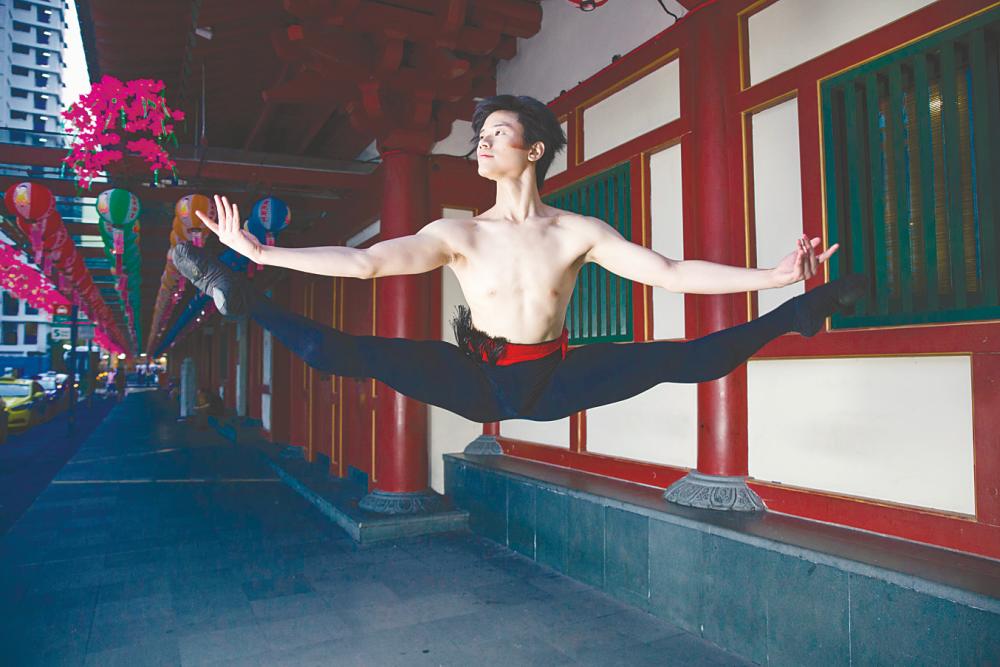YOU could say that Jeremie Gan was born to dance. The Malaysian ballerino was only about 11 years old when he won a scholarship from The Dance Society (a local ballet organisation) to attend a week of summer intensives in Melbourne.
There, he learnt about ballet and other genres of dance from teachers who came from all over the world.
The experience of being able to dance for the whole day at the classes he attended made Gan realised this was what he wanted to do for the rest of his life.
He had no hesitation later telling his mum, a ballet teacher, that “I would like to have this as a career”.
The 21-year-old is currently performing with the Singapore Dance Theatre. It helps that Gan is doing a distance-learning bachelor of science degree in business and management with the University of London which allows him to dance full-time with the theatre company.
Gan’s younger brother is also studying ballet in the US. The only family member dancing to a different tune is his father, who is a mechanical engineer.
When did you take your first dance lesson? What was it like?
“I was told I took my first dance lesson at age two-and-a-half. I honestly don’t remember, and it always felt intriguing to me since I never could actually remember a time before ballet, per se.
“Ballet has always been a part of me since the very beginning. As my mum is a ballet teacher, she had no one to take care of me while she taught classes, so she would just place me in a corner of the studio with some toys and food to keep me entertained.
“That’s where the spark must have ignited, and when I was old enough to comprehend simple instructions and commands, I was placed in one of the little kids’ classes to begin.
“I remember vividly being the only boy in the class [throughout] my ballet education, until the time I furthered my studies in New Zealand on a scholarship.
“But one memory that stuck with me was [wearing] a swimsuit ‘onesie’ with the zip at the front, as there were not many easily available choices for male ballet clothing at the time, and the leotards that were available were only the ones designed for females.
“So it was definitely a look [for me] during my first few years in ballet!”
Did you ever try other dance forms?
“It started off with ballet but after that summer school in Melbourne where I was exposed to other styles, I [enjoyed] contemporary as well, as it allowed my body to move in ways that are less restrictive as opposed to classical ballet.
“With most ballet companies now being much more diverse in their repertoire, there are more [chances of] exposure and [higher] expectation [for] ballet dancers to be able to perform in ballet shoes [for] traditional ballets, or barefoot in a contemporary piece.”
Male ballet dancers (ballerinos) seldom get the chance to shine, as most ballets focus on female protagonists. How do you overcome this challenge?
“I usually try to stand out during the solo sections of a ballet. Most ballets are designed in sections, with some sections [for] the entire corp de ballet (ensemble), some just [for] the men, and some as solo pieces.
“During the solos or male ensemble sections, if there are any, I would try to shine then and project [myself more to] the audience.
“However, during sections involving dancing or partnering with a female, I would focus on making her look good ... by not standing out too much and making her the focal point of the piece.
“Kind of like the condiments in a dish, if you can see and taste it where it becomes the main theme of the entrée, then it’s too much.”
What is the hardest thing a male ballet dancer has to put up with?
“The general stereotype that men don’t do ballet – and when the general public accepts that you dance and do ballet, they then have to get their head around the fact that it is your professional career which you have done tertiary studies for, and are getting paid just like any other profession.”














